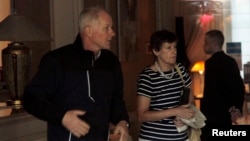UNITED NATIONS —
The United Nations says it believes it has “sufficient assurances” from parties in Syria for the safety of its inspection team and that the inspectors on Wednesday will visit the site of an August 21 chemical weapons attack that killed hundreds of people.
The U.N. team of about 20 scientists and experts tried to visit the site outside Damascus on Monday, but turned back after one of their vehicles was shot at multiple times.
U.N. spokesman Farhan Haq told reporters Tuesday that the attackers have not yet been identified.
Haq said there were a number of issues involved in getting the inspectors to the August 21 site and the team, under the leadership of Swedish scientist Ake Sellstrom, has been trying to resolve them.
“At this stage we believe we have the sufficient assurances from the various parties that they can go and that they will go tomorrow," said the spokesman.
Syria’s government blames rebels for the August 21 chemical attack, while activists say the government was responsible. Government bombing of the area has raised further concern that it is trying to destroy evidence of a poison gas attack.
The U.N.’s Haq said the team would still be able to collect valuable evidence such as witness statements and remnants of sarin gas, which can be detected in medical samples months after its use.
The U.N. team, which arrived in Damascus on August 18, was sent initially to investigate three earlier allegations of chemical weapons use, but the inspectors are not there to determine who may have used them.
Meanwhile, as international rhetoric intensifies, there is a growing sense that there soon could be a Western-led military response to the regime of President Bashar al-Assad - without a U.N. mandate.
Jeffrey Laurenti, a senior fellow and U.N. analyst with the Century Foundation, said with the U.N. Security Council divided over Syria, authorization for any military response would not likely come from that quarter.
“The Russians are clearly hunched down in protection mode for the Assad government," he said. "So the Security Council is not going to be authorizing any kind of measures -- punitive or otherwise -- to respond to this most blatant use of chemical weapons.”
Russia and China have repeatedly blocked actions at the Security Council to impose sanctions on the Syrian government for assaults on the civilian population during the civil war. And both nations say they will strongly oppose a Western military response.
The U.N. team of about 20 scientists and experts tried to visit the site outside Damascus on Monday, but turned back after one of their vehicles was shot at multiple times.
U.N. spokesman Farhan Haq told reporters Tuesday that the attackers have not yet been identified.
Haq said there were a number of issues involved in getting the inspectors to the August 21 site and the team, under the leadership of Swedish scientist Ake Sellstrom, has been trying to resolve them.
“At this stage we believe we have the sufficient assurances from the various parties that they can go and that they will go tomorrow," said the spokesman.
Syria’s government blames rebels for the August 21 chemical attack, while activists say the government was responsible. Government bombing of the area has raised further concern that it is trying to destroy evidence of a poison gas attack.
The U.N.’s Haq said the team would still be able to collect valuable evidence such as witness statements and remnants of sarin gas, which can be detected in medical samples months after its use.
The U.N. team, which arrived in Damascus on August 18, was sent initially to investigate three earlier allegations of chemical weapons use, but the inspectors are not there to determine who may have used them.
Meanwhile, as international rhetoric intensifies, there is a growing sense that there soon could be a Western-led military response to the regime of President Bashar al-Assad - without a U.N. mandate.
Jeffrey Laurenti, a senior fellow and U.N. analyst with the Century Foundation, said with the U.N. Security Council divided over Syria, authorization for any military response would not likely come from that quarter.
“The Russians are clearly hunched down in protection mode for the Assad government," he said. "So the Security Council is not going to be authorizing any kind of measures -- punitive or otherwise -- to respond to this most blatant use of chemical weapons.”
Russia and China have repeatedly blocked actions at the Security Council to impose sanctions on the Syrian government for assaults on the civilian population during the civil war. And both nations say they will strongly oppose a Western military response.




